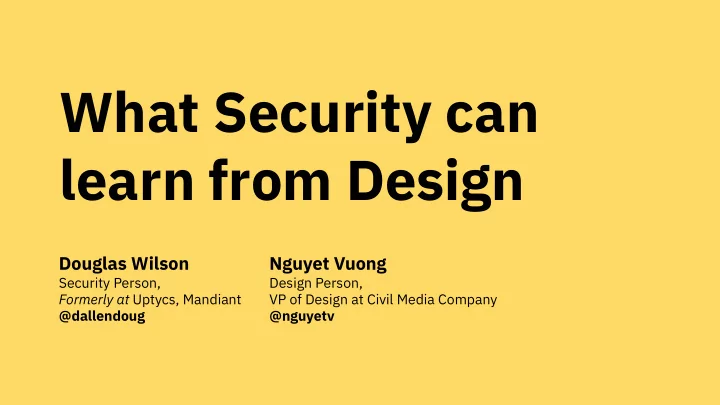

What Security can learn from Design Douglas Wilson Nguyet Vuong Security Person, Design Person, Formerly at Uptycs, Mandiant VP of Design at Civil Media Company @dallendoug @nguyetv
INTRO / Who We Are We are Nguyet & Doug Collectively, we have lived in and analyzed the worlds of Design and Security for a combined 36 years .
INTRO / W hy Are We Here Let us know if this sounds familiar: You must challenge the status quo to succeed You spend a lot of time examine unusual and unintended behaviors Despite amazing technology, success is often dependent on a few skilled humans Your area of expertise is often an afterthought at a lot of tech companies You are much more effective if included at the beginning of most processes
INTRO / W hy Are We Here First thought Security is the Yin to Design’s Yang
INTRO / W hy Are We Here Reframing Security is a design problem “Reframe problems - there are a number of very well known cognitive biases that can limit our thinking and restrict our choices. Indeed, studies have even shown that the way we frame things can play a significant part in whether we get started or procrastinate. By reframing our problems we can often look at situations in a new light and come up with much better solutions to them.” Adi Gaskell - 5 Steps To Help You To Design Your Life https://www.forbes.com/sites/adigaskell/2016/09/16/5-steps-to-help-you-to-design-your-life/
INTRO / W hy Are We Here But wait. I can’t draw. I don’t do graphics. How am I a designer?
INTRO / W hy Are We Here “Everyone is a designer. Not everyone is a good designer. Everyone can become a better designer.” -Jared Spool
INTRO / W hy Are We Here In going through this journey, we ask: How might we improve security solutions by applying insights from the design industry?
Phases of Design Thinking according to Stanford Design School
What is Design Thinking?
WHAT IS DESIGN THINKING ? Solution Human-Centered Design Viability Starts here Successful solutions solve problems for people. Desirability Feasibility Human-centered design starts with human desires. Successful solutions emerge in the overlap of these three lenses.
WHAT IS DESIGN THINKING ? A set of activities A set of activities we use to align teams, practice user empathy together, and deliver outcomes that successfully meet our users’ needs.
WHAT IS DESIGN THINKING ? IBM The Loop OBSERVE REFLECT MAKE
WHAT IS DESIGN THINKING ? IDEO Inspiration Ideation Implementation Credit: IDEO
WHAT IS DESIGN THINKING ? Stanford School of Design Build representations of one idea Ideate Empathize Test and gain user feedback Define Prototype Learn about Brainstorm the users and create Test solutions Sharpen key questions
The Methodology UNDERSTAND DEFINE IDEATE PROTOTYPE TEST
This is not a linear process UNDERSTAND PROTOTYPE IDEATE DEFINE TEST
Design Thinking Activities More constructed according to the needs of the workshop. This framework is flexible, and can be done in 1 week, 1 or 2 days or half day according to your needs. 2 hour Half day 1 day One week
UNDERSTAND PROTOTYPE IDEATE DEFINE TEST
Understand Understanding is gaining an empathic insight into the people you’re designing for and the challenges they are experiencing.
UNDERSTAND PROTOTYPE IDEATE DEFINE TEST
Define Defining is unpacking the findings from your understanding into needs and insights. And then turning those needs into a problem statement.
UNDERSTAND PROTOTYPE IDEATE IDEATE DEFINE DEFINE TEST
Ideate Ideating is generating a large number of ideas. Not perfect ideas, but lots of potential answers and solutions. No judgement . No evaluation. This is the time to let imaginations run wild!
UNDERSTAND PROTOTYPE IDEATE DEFINE DEFINE TEST
Prototype Prototyping is giving concrete form to abstract ideas. It is creating something that allows for interaction and experience, but doesn’t have to be fully functional. This is about learning, not about getting it right the first time.
UNDERSTAND PROTOTYPE IDEATE DEFINE TEST
Test Testing your prototype is putting it in the hands of the right people to gather feedback and maximize your learning.
UNDERSTAND PROTOTYPE IDEATE DEFINE TEST
Real life feelings Stefanie Di Rossi - https://ithinkidesign.wordpress.com/2012/01/18/a-brief-history-of-design-thinking-the-theory-p1/
How can we apply this in the security field?
This happens more than we’d like Told to implement a solution - “solve a problem” ● Create a technology-first solution ● Define the problem based on what’s affordable or available ● Implement dictated solution instead of exploring ideas ● End up with frustration and unhappy users ●
Phases of Design Thinking according to Stanford Design School
Understand Are you identifying with people in your organization? Did you get diverse input from different sources? Define Are you tackling solvable problems? If not, can you reframe them? Ideate Don’t just accept the first idea. Conduct structured brainstorming. Prototype Are you trying out ideas small before you go big? Are you getting feedback before committing to final products? Test Are you testing with your users and listening to feedback? Are you answering the right questions?
How to get started ● Talk to your users ● Engage your team ● Seek out designers in your organization. ○ Ask for help ● Go to design talks
This is just the beginning of a journey. We thank you for taking it with us.
Design Thinking Workshop Friday at 9:15 am - 10:45 am Lowther Room LIMITED CAPACITY
Thank you! Douglas Wilson Nguyet Vuong Security Person, Design Person, Formerly at Uptics, Mandiant VP of Design at Civil Media Company @dallendoug @nguyetv
Resources for further learning Stanford “D” School: https://dschool.stanford.edu/resources (new virtual crash course coming this fall!) IBM: https://www.ibm.com/design/thinking/page/framework Ideo: https://designthinking.ideo.com/ & http://www.designkit.org/ Designing Your Life - a book by Bill Burnett & Dave Evans: https://blog.marvelapp.com/shh-dont-tell-theres-no-magic-design-thinking/
Recommend
More recommend